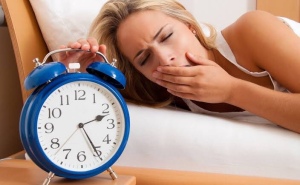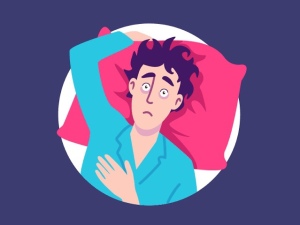Do you struggle to get to sleep no matter how tired you are?
Or do you wake up in the middle of the night and lie awake for hours, anxiously watching the clock?
Then you should understand the underlying problem first to find the solution.
What is insomnia?
“Insomnia means an inability to sleep,” or stay asleep at night, resulting in unrefreshing or non-restorative sleep. And it’s a very common problem, one that takes a toll on your energy, mood, and ability to function during the day.
Many adults experience short-term (acute) insomnia, which lasts for days or weeks. It’s usually the result of stress or a traumatic event. But some people have long-term (chronic) insomnia that lasts for a month or more and can even contribute to serious health problems.
Because different people need different amounts of sleep, insomnia is defined by the quality of your sleep and how you feel after sleeping—not the number of hours you sleep or how quickly you doze off. Even if you’re spending eight hours a night in bed, if you feel drowsy and fatigued during the day, you may be experiencing insomnia.
What are the signs and symptoms of insomnia?
• Difficulty falling asleep at night
• Waking up during the night
• Waking up too early
• Not feeling well-rested after a night’s sleep
• Daytime tiredness, Fatigue or sleepiness
• Mood disturbance like Irritability, depression or anxiety
• Difficulty paying attention, focusing on tasks or remembering
• Increased errors or accidents
• Ongoing worries about sleep
• Low motivation or energy
What causes insomnia?
Insomnia doesn’t just have one cause — it can be caused by a number of factors.
1. Medical conditions
• Nasal/sinus allergies
• Gastrointestinal problems such as reflux
• Endocrine problems such as hyperthyroidism
• Arthritis
• Asthma
• Neurological conditions such as Parkinson’s disease
• Chronic pain or Low back pain
2. Medication
• Certain antidepressants
• Medications for asthma or blood pressure
• Pain medications, allergy and cold medications
• Weight-loss products
3.Psychiatric conditions
• Tension
• Depression/ Anxiety
• Schizophrenia
• Bipolar disorder
• ADHD
• Getting caught up in thoughts about past events
4.Dietary habits
• Consuming too much caffeine
• Consuming too much alcohol
• Consuming too much nicotine
• Consuming heavy evening meals
5.Other Sleep disorders
• Sleep apnea
• Restless legs syndrome
• Jet lag
• Late-night shift work
• Having an inconsistent or irregular sleep schedule
6.Mental Health disorders
• Anxiety disorders
• Post-traumatic stress disorder
• Awakening too early
• Depression
How can You stop Insomnia?
Good sleep habits, also called sleep hygiene, can help you beat insomnia. Here are some tips:
• Keep your bedtime and wake time consistent from day to day, including weekends.
•Stay active — Regular activity helps promote a good night’s sleep. Try not to work out close to bedtime, because it may make it hard to fall asleep.
• Check your medications to see if they may contribute to insomnia.
• Avoid or try not to take naps during the day, because they may make you less sleepy at night.
• Avoid or limit caffeine and alcohol, and don’t use nicotine.
• Avoid large meals and beverages before bedtime.
• Make your bedroom comfortable: dark, quiet, and not too warm or too cold. If the light is a problem, use a sleeping mask. To cover up sounds, try earplugs, a fan, or a white noise machine.
• Create a relaxing bedtime ritual, such as taking a warm bath, reading or listening to soft music.
•Don’t use phones or e-books before bed. Their light can make it harder to fall asleep.
• If you can’t fall asleep and aren’t drowsy, get up and do something calming, like reading until you feel sleepy.
• If you tend to lie awake and worry about things, make a to-do list before you go to bed. This may help you put your concerns aside for the night.

Natural Treatment For Insomnia
Plenty of treatment options for insomnia are available. Good sleep habits and a healthy diet can remedy many cases of insomnia.
Foods that will help you ‘beat insomnia’
Blood sugar balance
Excessive sugar in your blood can have you feeling wide awake, whereas if your blood sugar is low, your body’s response is to release cortisol, will probably feel hungry which may keep you awake, and you may also feel irritable which won’t help either.
Eat a diet that will stabilise your blood sugar (known as the Low GL diet), this means eating low GL carbohydrates, as well as combining your low GL carbohydrates with protein in a ratio of 1:1, such as fresh fruit with a handful of nuts, oatcakes with humous or celery and cottage cheese.
Lack of Amino acid & B vitamins
The key sleep hormone is called melatonin. The conversion of an amino acid (tryptophan) into neurotransmitters and hormones requires nutrient co-factors, in particular the B vitamins, so a lack of these may also be responsible for low melatonin levels.
Include meat (red meat, poultry, fish), eggs, dairy products (milk, cheese), legumes (beans, lentils), seeds and nuts (sunflower seeds, almonds), dark leafy vegetables (broccoli, spinach, Chinese broccoli), and whole grains (brown rice, barley, millet).
Magnesium
Magnesium is known as ‘nature’s relaxant’. Increased magnesium intake may reduce anxiety, improve constipation, relieve menstrual cramps, reduce headaches and calm hyperactivity.
Increase your magnesium intake through increased intake of green leafy vegetables (eg spinach, kale, cabbage, spring greens etc) and pumpkin seeds.
Excess Caffeine
Caffeine has a variety of biochemical actions including increasing levels of stress and motivation hormones (catecholamines and cortisol) and suppressing melatonin production for up to ten hours. What many people don’t realise, however, is that we are very individual in terms of our sensitivity to caffeine and while some people seem to be able to drink a double-espresso after dinner and apparently sleep well, the more sensitive amongst us will suffer from poor sleep from just a single cup in the morning.
If your consumption is high, make the reduction gradually to avoid withdrawal symptoms. Instead, drink herbal teas or naturally caffeine-free teas such as Rooibos (redbush). You could also drink the occasional glass of tart cherry juice – those who drank two glasses of tart cherry juice versus placebo had increased melatonin levels, sleep duration and sleep quality.
Lack of Iron
Iron deficiency, even at levels insufficient to cause anaemia, has been associated with this syndrome, and iron deficiency anaemia is also associated with insomnia in pregnancy.
The good news is a high-fibre diet, with lots of whole grains, fruits, and vegetables, lowered the risk of sleepless nights. Fiber can help slow the rate at which your body absorbs glucose, could help cure or prevent insomnia.
Insomnia is often treated with cognitive-behavioural therapy or medications, but these can be expensive or carry side effects. Some people find over-the-counter sleeping tablets helpful, but they don’t address the underlying problem and can have troublesome side effects.
Try the varied preventions available for insomnia to help restore your normal sleep. Talk to your healthcare provider and discuss which of the lifestyle changes, behavioural therapies, or dietary options are right for you.




Leave a comment